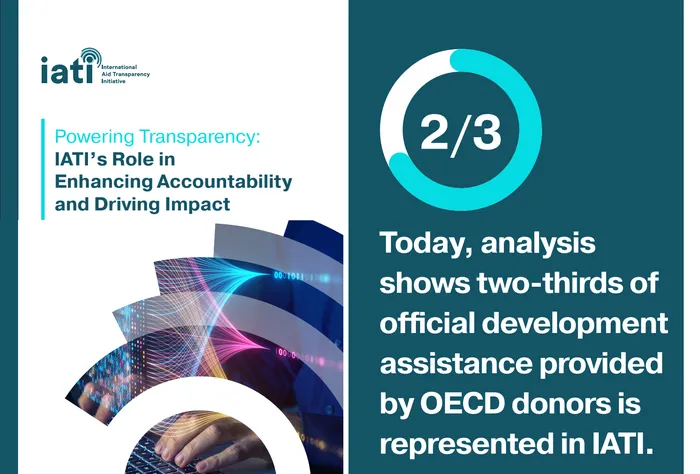New report highlights transparent, timely data is more vital than ever in a changing global aid landscape

Powering Transparency: IATI's Role in Enhancing Accountability and Driving Impact Report
As the global aid landscape grows more complex, the International Aid Transparency Initiative (IATI) has released its latest report, Powering Transparency: IATI’s Role in Enhancing Accountability and Driving Impact. The report highlights how IATI’s real-time, project-level data empowers governments, finance providers and civil society to drive effective decisions, ensuring scarce resources meet the needs of people and the planet.
Read the one - page summary | Read the summary report | Read the full report | Read the case studies
“This report serves as an essential reminder that we must deliver our work in an open, transparent way if we hope to secure a better future for our planet and its people.” – Marcos Neto, UN Assistant Secretary General, Assistant Administrator & Director of Bureau for Policy and Programme Support, United Nations Development Programme
The report was launched at the Virtual Members’ Assembly on the 16th January 2025, with an introduction of key findings by Thea Schepers, the Chair of IATI’s Governing Board.
Founded in 2008, IATI has reshaped how aid and development activities are tracked and understood. Over 1,700 organizations have used IATI to publish data on nearly one million development and humanitarian activities, representing over USD 3.5 trillion in spending. Over two thirds of official development assistance (ODA) from OECD countries is tracked through IATI data.
“This report serves as an essential reminder that we must deliver our work in an open, transparent way if we hope to secure a better future for our planet and its people” said Marcos Neto, UN Assistant Secretary General, Assistant Administrator & Director of Bureau for Policy and Programme Support, United Nations Development Programme. “To tackle humanity’s most urgent challenges we need to rebuild trust in the development system. IATI plays a crucial role in this by making information on trillions of dollars in development finance open and accessible.”
“I am proud to reflect on the achievements of IATI”, said Freek Kepples, Director of Financial and Economic Affairs at the Ministry of Foreign Affairs in the Kingdom of the Netherlands. “IATI allows us to track the impact of our aid, ensuring it reaches those who need it most, while also serving our national interests. For this incredibly valuable open data agenda to remain successful, it must evolve into a core tool for decision- making in international development.”
Transparency in Action
This report goes beyond numbers to highlight the specific ways IATI’s data is driving change:
- Nigeria: IATI data helped map USD 5 billion in development activities to the country’s national development plan, improving alignment with its goals
- Food and nutritional security: Through close collaboration with the Global Alliance for Food Security, IATI-supported data tracked over 43,000 transactions, helping 25 countries respond to food and nutritional crises more effectively
- Regional decision making: Latin America’s development bank, CAF, joined IATI in 2024, publishing data about USD 5 billion projects across 14 countries.
Challenges Ahead
IATI is calling on governments and organisations to prioritise transparency, not just as a reporting requirement, but a critical lever for achieving impact in the years to come.
The report highlights that closing the $4.2 trillion Sustainable Development Goal financing gap by 2030 will require a greater commitment to open data. It calls for a greater global commitment to transparency, particularly in key areas like climate finance and humanitarian response, where the need for reliable, near-time information has never been greater.